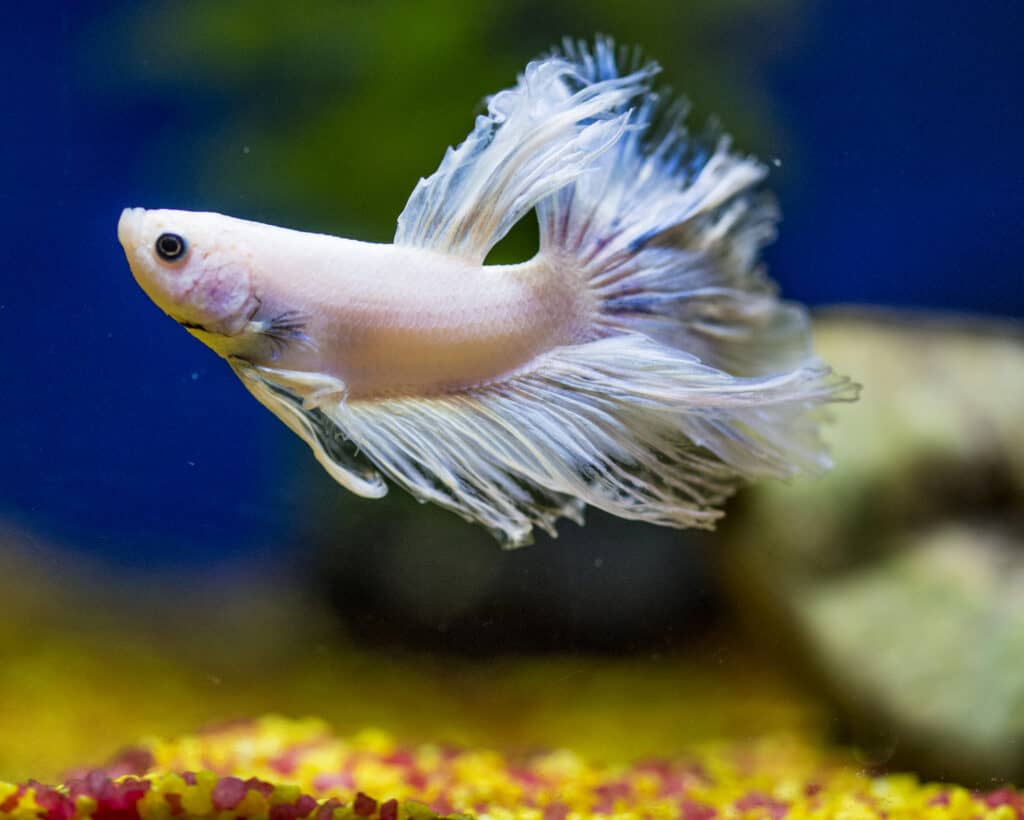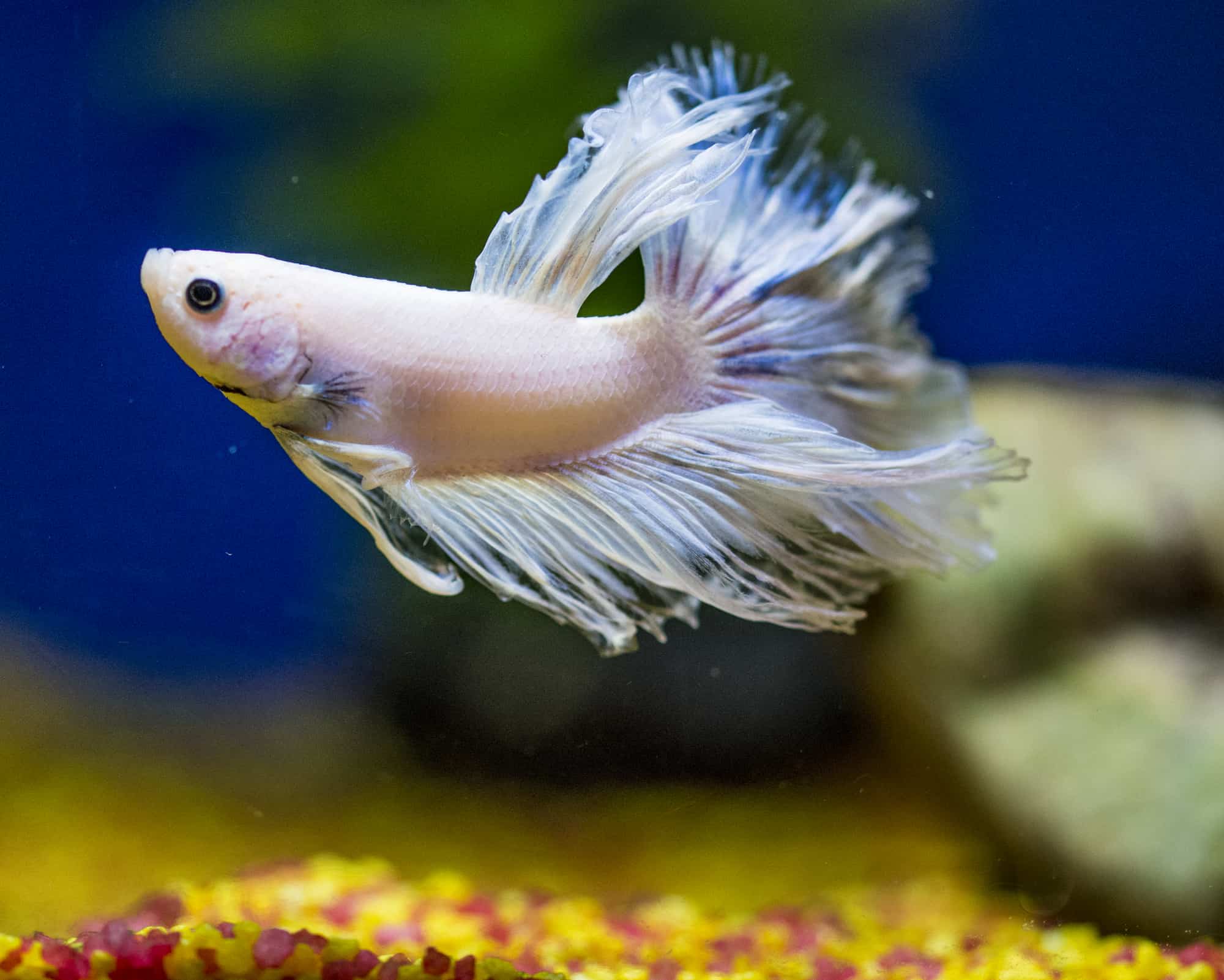You may wonder whether your betta fish has feelings, or are you just imagining it?
The answer is nobody knows precisely what betta fish experience, but science and direct human observation both suggest that there’s a vast array of feelings and emotions in betta fish, maybe more than we ever imagined!
So how can we make sure our betta fish feels happy, healthy, and well-cared for? Let’s find out all about a betta fish’s true feelings.
Do Betta Fish Have Emotions?
If you’ve ever developed a close bond with your betta fish, you probably began to feel that your pet fish could feel emotional affection towards you.
You were likely also observing different moods in your betta fish, as it acted differently from day to day.
But what does science have to say about this? According to traditional science, emotions are generated in the brain, so how does a betta fish’s brain compare with ours?
Do Betta Fish Have a Brain Like Ours? Can They Think?
Scientific studies of fish brains reveal that they are surprisingly like our own. Fish brains have a basic cerebral cortex – the part of the brain structure that processes information, ‘thinks,’ and controls bodily movement.
Scientists have also discovered that fish have neurotransmitters in their brains – chemicals that affect emotion, mood, and stress management. Dopamine and serotonin, for example, give rise to a happy, calm mood.
As well as neurotransmitters, fish also produce hormones such as endorphins which reduce pain and boost feelings of relaxation.
Emotions Don’t Only Come From The Brain
Intelligence and emotion might not be all about the brain, you know!
In recent decades, scientists have started to understand just how important other organs are in producing emotions, too.
The human heart, for example, contains thousands of neurons that behave much like they do in the brain. This ‘heart-brain’ communicates with the rest of the body neurologically, biochemically, biophysically, and energetically.
This indicates that a highly developed brain might not be the only component that’s necessary to experience highly developed emotions. Animals with more primitive brains, such as fish, may not be experiencing more primitive emotions.
Do Betta Fish Have Different Moods?
If you’ve ever observed your betta fish for a long time, you’ve probably figured out that he or she has different moods!
Betta fish have distinct personalities, and their moods can swing from feisty and aggressive to calm and sleepy in just a few minutes.
Have you ever tried playing with a betta exercise mirror? It gives your male betta fish the impression that there’s another male in the tank with it, triggering his natural fight response.
He will flare and maybe even try to attack his mirror image, but take the mirror away, and he will likely become quite calm again within 5 minutes.
Direct observation and science both conclude that mating, feeding, sleeping, and the general condition of a betta fish’s environment also greatly affect its mood.
Do Betta Fish Have Personalities?
If you’ve ever kept more than one betta fish, you can probably attest that there are no two alike! Betta fish are remarkably unique, and each one has its own singular character.
This can present problems for us aquarium advisors! We do our best to recommend which environments and setups are suitable for betta fish, but the truth is, what is good for one betta fish might not be the best for another!
A great example is when choosing betta fish tank mates. While some bettas are peaceful fish that will happily live in a community tank with other fish like guppies, platies, and tetras, other bettas are incredibly aggressive fish that will refuse to even live peacefully with aquarium snails!
You may have also noticed that while one betta has a very active, energetic character, another one prefers lying around in his hammock all day. Different preferences for food, environment, and activity tell us that bettas really do have bags of personality!
Can a Betta Fish Feel Pain?
For some time, scientists assumed that fish couldn’t feel pain because their brains lacked the complexity of humans and primates.
Bear in mind, however, that much animal consciousness was largely denied by science until recent times, and it’s only recently that scientists have begun to realize how much animals have in common with us in terms of emotion and thought processes.
A scientific study published in 2015 reported that fish do indeed have nociceptors like humans do to feel physical pain. They also appear to react predictably to painful stimuli.
That study, among many others, suggests that there’s overwhelming evidence for fish feeling pain and that we may do well to revise our ethical policies regarding the treatment of fish in captivity, fisheries, and laboratories.
Can a Betta Fish Feel Depressed?
Like us, it seems that betta fish can go for prolonged periods of feeling sad and unenthusiastic about life.
More recent scientific models of animal physiology and emotion appear to confirm what fish keepers have felt for a long time – that their pet fish can indeed become depressed.
Loss of appetite, lethargy, and stress stripes are all indications that your betta fish is unhappy. We’ve devoted a complete article to depression in betta fish and what you can do to make your fish happy again here.
Can a Betta Fish Feel Lonely?
Bettas are highly intelligent fish and seem to love stimulation and interaction. Some owners have even trained their betta fish to perform tricks like swimming through hoops and jumping out of the water!
These interactive exercises are brilliant for getting your betta looking his beautiful best. A betta fish that is given a lot of stimulation and attention tends to look brighter, more vibrant, and even more colorful than those who are ignored.
Those who’ve kept bettas for a while know that a betta fish who’s left alone for long periods will often begin to look dull and appear to be missing company.
While many betta owners like to keep betta fish with other tank mates such as compatible fish, shrimp, and snails to help keep their betta entertained, those with a highly aggressive fish sometimes find that their betta will fight with and kill anything else that’s added to their tank.
Again, it’s largely a question of each betta’s unique personality.
Do Betta Fish Like To Be Talked To?
Some people are shy to admit it, but I think most betta owners talk to their fish!
From all of my research, I concluded that betta fish can hear their owners talking and probably enjoy being spoken to as well.
The great thing about this is that many people can find talking to their fish very therapeutic. A betta will never judge, mock, or challenge you as people do, so it can be a mutually beneficial relationship for both of you!
I wrote a specially dedicated article about talking to betta fish a while ago. You can find it here.
How Can I Keep My Betta Fish Happy?
All of the evidence points to the fact that bettas do indeed have feelings, moods, and emotions. So how do you make sure that your betta fish remains happy and content as much as possible?
Here are some of my top tips to keep your betta glowing with health and happiness:
Right Tank Setup
Firstly, provide your betta with a large enough tank.
Although some people have kept bettas in 3-gallon nano tanks or fish bowls without a filter, this is exceptionally cruel treatment and will nearly always result in an unhappy betta fish dying prematurely.
5 gallons is the minimum tank size for a single betta fish, but 10 gallons is better. Make sure your tank’s water temperature and water parameters match our care guidelines and provide plenty of hiding places for your betta to take refuge.
Densely planted tanks are especially good for betta fish that love to explore and hide among aquarium plants. Live plants can also contribute to improving the tank’s water quality.
Right Tank Maintenance
Your betta fish will only be at its best when you provide it with the best possible water quality and aquarium maintenance:
- Provide your betta with a good filter and clean it every 2-3 weeks.
- Vacuum your substrate every 1-2 weeks.
- Make partial water changes of 10-30% every 1-2 weeks, with treated water of matching temperature.
- Get yourself a reliable heater and thermometer. Make daily checks to ensure the temperature is within the ideal range of 78-80°F for your betta fish.
- Test your aquarium’s water at least once a month or any time your fish seem unwell.
Right Feeding
Your betta fish will be so much happier, healthier, and better looking when you provide him or her with the right diet. Bettas are fairly carnivorous fish, so can benefit massively from regular helpings of live and frozen foods.
Maintain a strict feeding schedule and, most importantly, avoid overfeeding! Overfeeding is one the greatest causes of poor water quality and betta fish health issues. Never feed more than your fish can eat within 2 minutes.
Proper Fish Care and Attention
As we’ve just learned, betta fish are highly intelligent, social fish that revel in beneficial interaction with their owner.
Try talking with your fish, teaching it tricks, or feeding it its favorite foods to make sure it feels loved and well-cared for.
Make sure you’re spending lots of time observing and interacting with your betta to ensure it’s in good health and its spirits are high.
Right Tank Mates (Optional)
Lastly, some betta owners feel that their fish is most happy when sharing its betta tank with other tank mates.
Other types of fish and invertebrates can help to keep your betta feeling entertained, but it’s also essential that you choose the right ones that will neither be harmed by nor be aggressive towards your betta.
While there are never any guarantees that things will work out, some tank mates are much more suitable choices than others!
The best choice in small tanks of up to 10 gallons is shrimps and snails. I’d particularly recommend nerite snails and amano shrimp because they don’t breed in freshwater, so won’t overpopulate your tank.
In a larger, 20-gallon aquarium, you could also add schooling fish such as peaceful tetras, rasboras, and Corydoras catfish to give your betta plenty of peaceful, benign company.
Conclusion
Betta fish are highly intelligent fish that probably experience more feelings than most would have imagined.
Both direct observation and the direction of scientific findings suggest that betta fish do indeed feel emotions, moods, pain, and even depression and happiness, just like we do.
All of this reveals just how important it is to keep your betta fish feeling happy and well-cared for.

